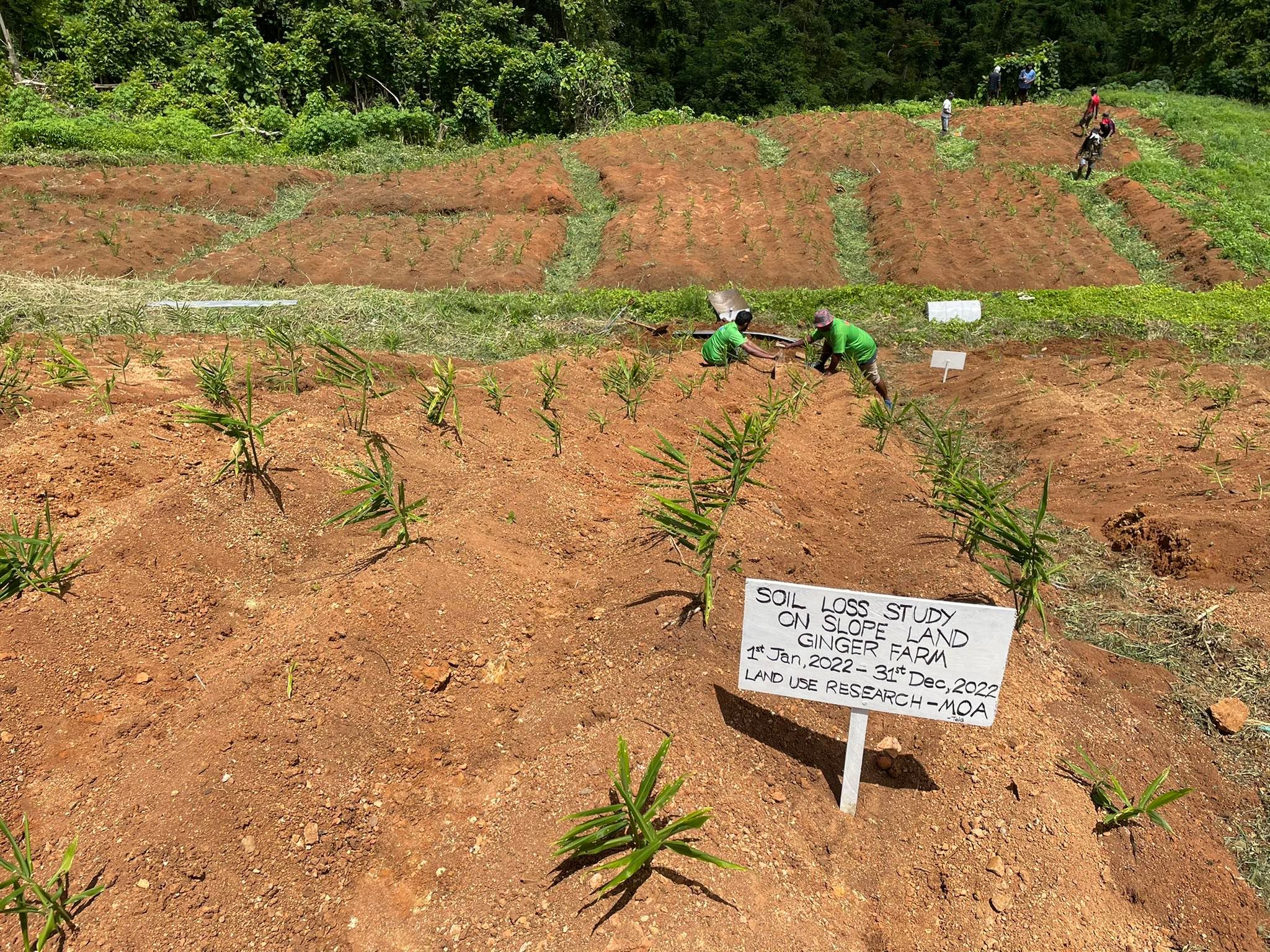SOIL IS WHERE FOOD BEGINS
December 8, 2022

Picture: A soil loss study done by the Ministry of Agriculture landuse team on a slope land ginger farm.
World Soil Day (WSD) is observed every year on December 5, to highlight the value of healthy soil and to promote the sustainable management of soil resources. All around the world, people use this day to inform and inspire, and there’s a different theme to focus on each year. It reminds us to appreciate this incredible natural resource — the source of our food, the anchor of our ecosystems, and that’s merely scratching the surface.
In 2013, the Food and Agriculture Organization (FAO) of the United Nations- Global Soils Partnership conference unanimously endorsed World Soil Day. In 2014, the U.N. General Assembly designated December 5 as the first official World Soil Day.
The Ministry of Agriculture celebrated World Soil Day at the Navuso Agriculture Technical Institute (NATI) in Nausori this week with students, industry stakeholders, NGOs and farmers.
Senior research officers from the Ministry’s research division advocated the importance of soil in maintaining a healthy ecosystem.
The theme and campaign of this year’s World Soil Day is: "Soils: Where Food Begins" which aims to raise awareness of the importance of maintaining healthy ecosystems and human well-being by addressing the growing challenges in soil management, increasing soil awareness, and encouraging societies to improve soil health.
The Fijian agriculture sector has always been more than food production. Over centuries, farming shaped the Fijian landscape, local communities’ livelihood, the Fijian economy and diverse cultures. However, the agricultural landscape is changing. We are faced with new and unprecedented challenges such as climate change including changes to land use, poor soil health management, and environmental degradation and most recently the COVID-19 pandemic. These challenges continue to threaten our ability to fulfill the national Strategic Development Plan (SDP) to improve food and nutrition security and our International commitment to Zero Hunger.
Too often, we forget that the foundation of agriculture is having healthy soil; a natural but limited resource below our feet that we often take for granted. Soil is more than just a medium for agriculture. It provides a host of other ecosystem services such as water filtration, nutrient cycling, and most importantly a sink for long term carbon sequestration to combat carbon emissions.
Sustainable agriculture is fundamental to the future prosperity of Pacific Island Countries and Territories, especially to the Small Island Developing States (SIDS). Commercial farming is an important source of sustaining SIDS economies and often brings in much needed foreign exchange. Amidst the COVID-19 pandemic, the agriculture sector has brought in the much needed foreign revenue through the export of fresh and chilled produce. Despite its economic importance often the sector is challenged for the use of good agricultural practices and promotion of sustainable use of resources (including the soil).
According to the World Bank, Fiji was reported to have approximately 4.2 percent of arable land in 2020. However, that too is shrinking due to industrialization and urbanization. The key chemical properties such as soil pH, Phosphorus, Cation Exchange Capacity (CEC), Nitrogen and Carbon levels are gradually declining. Deforestation, toiling on steep slopes, bad agricultural husbandry practices and reclamation of mangrove areas are key causes of land degradation in Fiji.
According
to the Pacific Soil Portal, a study on a heavily forested area suggested losses
of up to 50 tonnes of soil per hectare each year through run-off. Urbanization
has also led to the capping and sealing of arable land in major centers. The
steep topography compounded by high rainfall intensity contributes to the
natural state of erosion. There is a need to increase our efforts to promote
more soil carbon, soil health, and soil fertility awareness through organic
initiatives so that our coming generation will have food on their table.
The Ministry of Agriculture, through its research institutions over the years has been ensuring that appropriate technologies are developed to address effective and efficient management of soil across Fiji. With the help of our research stations, we have been investing in research and development to find practical affordable and resilient technologies to mitigate climate change and improve soil health and fertility.
To complement our efforts towards looking after our soils, the Ministry of Agriculture has recently introduced a mobile soil testing service as well as established a climate smart unit. One of the outputs of this new climate smart unit is to reduce the amount of synthetic fertilizer that goes into the soil. The unit is working with a number of farming communities (including those in maritime areas) to develop organic based fertilizers using bacterium culture and composting.
The Ministry urges all Fijians including
the farmers to protect and manage one of the most vulnerable resources- SOIL. All
the food we eat has a link to the soil and good soil health is imperative in
sustaining food and nutrition security for now and in the future.
Let’s look after our soils today as we have borrowed this from our future generation.
-Ends-
